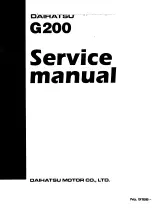
•
Drive a heavily loaded vehicle or tow a trailer.
•
Carry unnecessary weight (approximately 1 mpg [0.4 km/L] is lost for
every 400 pounds [180 kilograms] of weight carried).
•
Add particular accessories to your vehicle (e.g.; bug deflectors,
rollbars or light bars, running boards, ski racks).
•
Drive with the wheels out of alignment.
DRIVING THROUGH WATER
WARNING:
Drive through water in an emergency only, and not
as part of normal driving.
WARNING:
Engine damage can occur if water enters the air
filter.
Note:
Driving through deep water may allow water into the transmission
or air intake and can cause internal vehicle damage or cause it to stall.
Note:
Once through the water, always dry the brakes by moving your
vehicle slowly while applying light pressure on the brake pedal.
If driving through deep or standing water is unavoidable, proceed very
slowly. Never drive through water that is higher than the bottom of the
wheel rims (for cars) or the bottom
of the hubs (for trucks).
When driving through water,
traction or brake capability may be
limited. Also, water may enter your
engine’s air intake and severely
damage your engine or your vehicle
may stall.
Wet brakes do not stop the vehicle
as quickly as dry brakes.
254
Driving Hints
2015 Taurus
Owners Guide gf, 2nd Printing, November 2014
USA (fus)
















































